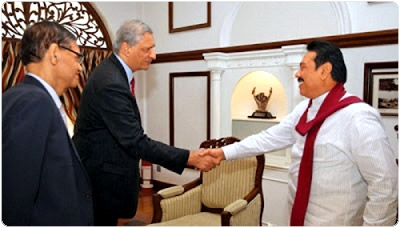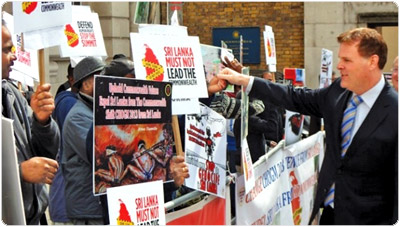See change in Sri Lanka
By Manjula Fernando
Sri Lanka will celebrate the fourth year
of its victory over the LTTE on May 19, the day the military ended the
three-decade long war against terrorism.
|

President Mahinda Rajapaksa meets Commonwealth Secretary
General, Kamalesh Sharma.External Affairs Minister Prof. G.L.
Peiris is also in the picture. |
Four years on but the battle against the LTTE in the context of its
international fronts and supporters who campaign for a separate, state
within the tiny island nation is far from over. With the blessings of
gullible host states, these terror fronts keep multiplying and mounting
pressure on Sri Lanka with an ultimate goal to create the ground for
'external intervention', their only hope now for separatism and Eelam.
The Global Tamil Forum (GTF), the umbrella organisation of all LTTE
fronts scattered worldwide, recently made no bones about its displeasure
over the Commonwealth Heads of Government Meeting (CHOGM) being held in
Sri Lanka when it told The Island newspaper, that 'they will intensify
the campaign to discourage the Queen and main member states from
attending the international summit'.
The reason behind their argument is that the Government should not be
given the honour of hosting this event and prestige of holding the chair
for the next two years.
But the actual reason, as put by an international terrorism expert is
far from this view.
Prof. Rohan Gunaratna in a recent interview with the Sunday Observer
opined that the LTTE rump will attempt and do its best to discredit Sri
Lanka at every international event that the country is present, be it
the UN Human Rights Council, the UN General Assembly, CHOGM, CMAG or any
other international forum. He said,' CHOGM is one of the most
prestigious events in the global calendar. The focus of LTTE remnants
overseas is to disrupt CHOGM from being held in Sri Lanka.
The defeated terrorists and their supporters are fully aware that if
the CHOGM is successfully held in Sri Lanka, the world will witness at
first-hand the amazing progress Sri Lanka has achieved in the last three
years.'
As explained by him it is no secret that in record time, Sri Lanka
resettled 283,000 Tamils held hostage by the LTTE, rehabilitated and
reintegrated 12,000 LTTE cadres, and invested in unprecedented
development in the North and the East. The proof of this is out there
for all who visit the country to see. It is his view that the LTTE rump
and its premier umbrella organisation, the GTF have not given up its
political goal of separatism, it is their aim to discredit Sri Lanka and
win the hearts of the world community to support them in their shrewed
ambition.
|

Canadian Foreign Minister John Baird greets pro-LTTE protesters
after the Commonwealth Ministerial Action Group (CMAG) meeting
in London recently. |
By the standards of other troubled zones such as Iraq, Afghanistan,
Kashmir, Chechnya, Xinjiang, Sri Lanka's progress is immense since it
defeated one of the world's most ruthless and deceptive terrorist groups
and lost no time in developing the troubled zone.
Every visiting Government member in recent times acknowledged and
appreciated the 'See change' in Sri Lanka.
At the recently concluded Commonwealth Ministerial Action Group the
LTTE lobby fronts did a do or die effort to shift the venue of CHOGM
from Sri Lanka.
But at the subsequent press briefing by the Commonwealth Secretary
General, Kamalesh Sharma, CMAG Chair Bangladeshi FM, Dipu Moni and the
Vice Chair, Australian FM Senator Bob Carr, explained as a matter of
fact why Sri Lanka should host the Heads meeting this year.
The Secretary General said, ' As the Commonwealth, we try to be
practical in offering our assistance, and have embedded action for
beneficial changes as far as the members are concerned. In the spirit of
a helping hand, which we give to all members, we have been engaging
across a wide front in Sri Lanka with my good offices, and this will
continue in the months to come. I am sure it will yield very good
results in all the areas of human rights, of rule of law, of governance,
institution building and strengthening.
While underscoring the need for full implementation of the LLRC and
accounting of the things happened at the end of terrorism, the
Australian foreign Minister stressed 'Sri Lanka is not the only country
in Asia to be demonstrating tensions and violent tensions between
different religious groups' adding, 'We need to do no more than
encourage and help the government of Sri Lanka to reach its own
benchmarks, the benchmarks that it itself has agreed are desirable.'
He said in the lead up to CHOGM, the Commonwealth is in a good
position to engage with the Sri Lankan Government. A far cry from the
anti Lankan lobby and LTTE sympathisers that Sri Lanka should be
isolated for what it has done in the past - basically crushing a
ruthless terrorist outfit.
It was an understanding the people of Sri Lanka expected. To the
dismay of anti lobby groups, the Secretary General was also quoted as
saying, "We sympathise with the fact that Sri Lanka has had a long
period of agony from which it is emerging and it will take a while
before a lot of the healing which we expect can take place."
Adding that the Commonwealth was making a bigger contribution to the
international community he said 'if you look at who is making statements
and who is doing the real work on the ground, you will be able to tell
the difference. It is the Commonwealth which is on the ground and making
a difference on those issues which most people are talking about'.
Pleased after Canada's undiplomatic action at the CMAG, where its PM,
Stephen Harper called a boycott of CHOGM, the LTTE fronts and
sympathisers turned its focus on Britain. A few days after the Global
Tamil Forum disclosed their plans to approach the UK Government, a
spokesman for the British government that the PM would in fact make it
to the Heads meeting in Sri Lanka. The spokesman was quoted in the
paper, 'We believe that the attendance of many world leaders and the
global media will help to shine a light on what is going on the country,
what has been achieved and what more needs to be done'.
The British Premier is expected to use the visit to see the situation
in the country himself and be clear on what progress is needed. The news
is welcoming for every citizen of this country. Even though the brutal
war with LTTE terrorism, the killings, fear of life and the uncertainty
is a thing of the past, achieving positive peace in Sri Lanka will be a
long and arduous journey. It is a journey all Sri Lankans yearn for and
that has already begun. To walk with them Sri Lanka needs friends, the
types of the Commonwealth, who would help in a spirit of friendship, not
those who throw roadblocks in its path. |


